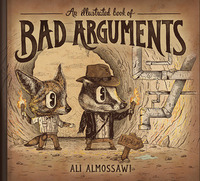Take a photo of a barcode or cover
I teach a university class called "Introduction to Composition and Argumentation". The class has freshmen students work through the rudiment of sound reasoning, critical thinking and eloquent writing. Generally speaking, I find that most students are pretty terrible at all three of these. It is not entirely their fault: our culture and our educational institutions punish those who question and reason from sound positions. I have spent a good part of my working life undoing the intellectual cancer that we call high school. But today I have found a new weapon for my arsenal in Almossawi's charming and witty little book. I think that I will make this mandatory reading for all my students.
This is an incredibly short book which I found mildly interesting. It is an explanation of different forms of arguments. It would make a good primer for certain philosophy or public speaking classes, and for those who are just interested.
This is a fun book. A free online version is available, but I like having a physical copy. The author devotes a page each to the most common types of logical errors and diversion tactics. Each one is accompanied with a cartoon of animal characters depicting humorous examples of the given errors. Newcomers to debate and rhetoric will find this a very clear and entertaining introduction. Experienced readers will also appreciate it for its entertainment value, the esthetic value of the cart, and the clarity with which it illustrates the examples. A glossary is included at the end. A fun quick read.
I really hope that they are going to translate this book, because I have to show it around. I learnt much more while reading it that in my years of debating the subject, sometimes it's really true that images are better that thousands words.
Spero davvero che traducano presto questo libro, perché ho molte persone a cui farlo comprare. Ho imparato di piú mentre lo leggevo che in anni di dibattiti sull'argomento, a volte é proprio vero che un'immagine vale piú di mille parole.
Spero davvero che traducano presto questo libro, perché ho molte persone a cui farlo comprare. Ho imparato di piú mentre lo leggevo che in anni di dibattiti sull'argomento, a volte é proprio vero che un'immagine vale piú di mille parole.
My son and I worked thru this book and it truly helped him understand poor arguments and create better ones for himself.
Got this as a gift as a joke, but turns out is a easy to digest but insightful book. I wish it was required reading for participating in social media, for the lack of basic logic is really painful and damaging to any sort of meaningful social interaction.
This is a terrific concept--I love the idea of taking common logical fallacies, distilling them down to their essences, and illustrating them with cartoons and simplistic examples. The execution left two things to be desired: first, some of the examples were very poor (as in, no one would ever make that argument; it's not merely a fallacy, it's ridiculous. There have to be better possible examples.) Second, the author's political bias was very obvious on nearly every page.
With brilliant illustrations and simple wording, Almossawi breaks down the way arguments are formed. They give multiple examples alongside with bad arguments often relate to each other. This book will be one that I use in my thesis when talking about group think, the Christian church, and sexuality.
Excelente. Uma boa introdução ao ceticismo. E ideal para quem gosta de ler livros não-fictícios. Além disso, é fácil encontrar no livro paralelos com o cotidiano de falácias cometidas pelos outros e, obviamente, por nós.
Recomendo a leitura de "38 Estratégias Para Vencer Qualquer Debate" de Arthur Schopenhauer.
Recomendo a leitura de "38 Estratégias Para Vencer Qualquer Debate" de Arthur Schopenhauer.
informative
lighthearted
reflective
fast-paced


